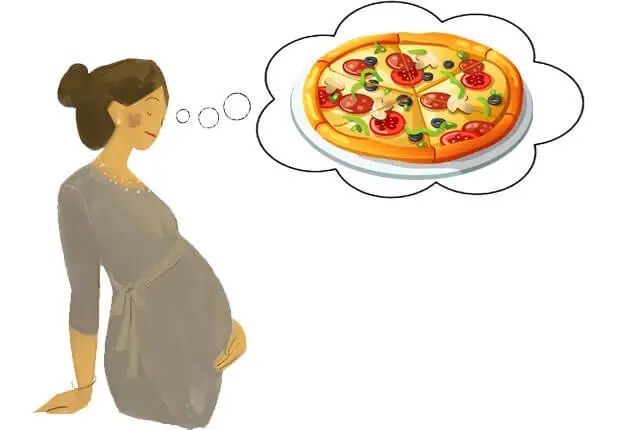Many pregnant women report craving specific foods, with pizza being among the most often mentioned. Can pregnant women eat pizza? Learn whether eating pizza and its traditional toppings, such as pepperoni, mozzarella, or ham, is safe while pregnant.

Can Pregnant Women Eat Pizza?
Yes! Pregnant women can eat pizza, but there are some things to pay attention to during pregnancy.
When eating pizza during pregnancy, follow these two recommendations:
- Ingredients for your pizza: Choose toppings carefully, as not all are appropriate for consumption during pregnancy.
- The size of your portion: Eat pizza in moderation.
Pizza Toppings in Pregnancy
Lucky for you, you can eat quite a lot of pizza toppings when you are pregnant. Just ensure they are prepared and stored correctly to reduce the risk of foodborne illness.
Which pizza toppings are safe for pregnant women?
Let’s look into some of the most popular pizza toppings:
1. Mozzarella:
Pasteurized cheese like mozzarella is safe to eat during pregnancy, whether served cold or cooked. That’s because pasteurization kills harmful bacteria, like Listeria, in the cheese.
Another great thing to remember when eating mozzarella cheese products is that some are higher in salt and fat than others. So, we recommend you choose low-fat mozzarella cheese during pregnancy.
2. Ham:
Smoked or cured ham is a common topping on pizza. Although deli meats are known to have a higher risk of being contaminated with toxoplasmosis, you can eat ham on the pizza.
This bacteria is very rarely present in ham anyway. But if it does happen, the high temperatures while baking the pizza will kill it.
3. Pepperoni:
Cured meats like pepperoni are more likely to be contaminated with bacteria that can cause food poisoning. However, baking the pizza kills any potential bacteria in the pepperoni, like with the ham.
But remember that cured meat is high in saturated fat, salt, and nitrates, while not containing many essential nutrients. So, during pregnancy, eat pepperoni pizza in moderation.
4. Vegetables:
Vegetables are a good source of nutrients, so top your pizza with some. You can use bell peppers, onions, mushrooms, spinach, etc. As mentioned above, the hot temperature during pizza baking kills any harmful bacteria, parasites, or viruses. But make sure you wash all your veggies before cooking anyway!
5. Lean protein:
Opt for toppings lower in saturated fat and calories, such as grilled chicken or shrimp, or vegetarian options like black beans or tofu.
Recommendations for Eating Pizza during Pregnancy
It is hard to generalize when it goes to eating pizza during pregnancy. There are so many different crusts and toppings available. Not to mention every pregnant woman is unique.
How much pizza can a pregnant woman eat?
The proper pizza portion for a pregnant woman depends on her overall calorie needs, which differ from woman to woman.
Calorie needs depend on the pregnant woman’s weight and height, her activity level, and the progress of her pregnancy.
The proper pizza portion for a pregnant woman also heavily depends on the pizza type and its topping. Heavily-topped pizzas are high in calories, fat, and salt, so it is better to avoid them during pregnancy. Instead, top your pizza in moderation and use light products and lots of vegetables.
While pizza can be a part of a healthy pregnancy diet, you must pay attention to portion size and choose healthy toppings. The more nutritious ingredients such as vegetables, whole grains, lean proteins, and low-fat dairy products you add to your pizza, the more pizza you can eat during pregnancy.
Guidelines for eating pizza safely while pregnant:
1. Choose a whole-grain crust:
A whole-grain pizza crust (whole wheat or multigrain) is healthier than a white flour one. It is higher in fiber and nutrition, thus being a better choice for pregnant women.
2. Top your pizza with a lot of vegetables:
Vegetables are a healthy option to use as a pizza topping.
3. Opt for a light cheese:
Use less full-fat cheese to lower the amount of saturated fat and calories. Even better, choose low-fat cheeses like light mozzarella.
4. Choose lean meat:
Choose toppings that are low in saturated fat and calories, such as grilled chicken or shrimp.
5. Limit your intake of processed meats:
Use less pepperoni, sausage, and ham than usual. They typically include a lot of salt, saturated fat, and nitrates.
6. Watch portion size:
Eating larger pizza portions contribute to excessive calorie intake and weight gain. So order smaller or thin-crust pizzas.
7. Balance with other foods:
Don’t eat pizza too often. Instead, eat a balanced diet during pregnancy!
Are there any Benefits of eating Pizza during Pregnancy?
If you choose healthy ingredients, eating pizza during pregnancy has a few benefits. Nonetheless, we must accept that pizza is more of a treat than a nutritious food.
1. Pizza can be a source of protein:
Meat, poultry, and cheese used on the pizza are a source of protein, which are essential for the proper fetus’s growth and development.
2. It can be a source of fiber:
If you choose a whole-grain pizza, you will get a lot of fiber and other essential nutrients like iron and B vitamin.
3. Pizza can be a source of vitamins and minerals:
Topping your pizza with nutritious vegetables can provide vitamins, minerals, folate, and potassium.
4. It provides some calcium:
Cheese on your pizza is a source of calcium needed for the fetus’s bones and teeth development.
Are there any Risks of eating Pizza during Pregnancy?
Pizza is safe as long as it is adequately cooked, made with safe ingredients, and consumed in moderation.
The heat from baking a pizza kills any potentially harmful bacteria in the meat, cheese, and veggies. However, be mindful of Listeriosis and Toxoplasmosis anyway. They are severe infections in pregnancy that may cause miscarriage, stillbirth, etc. So, make sure your pizza is fully cooked!
Another important fact is the high calorie, salt, and fat content of most pizzas. While too many calories and fat could lead to gaining too much weight during pregnancy, can high salt levels cause high blood pressure and pre-eclampsia, which are dangerous complications during pregnancy.
Ask your doctor for personalized advice if you have any questions, concerns, or reservations about eating pizza during pregnancy!
